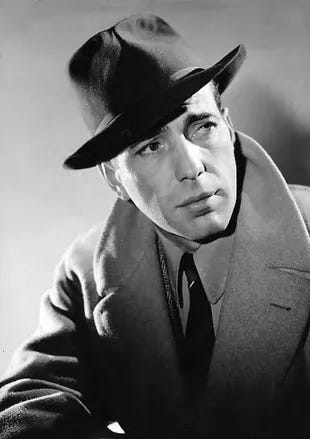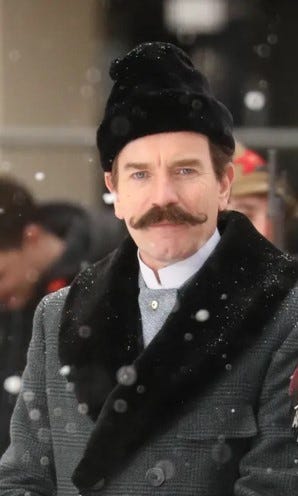Greetings readers,
This planet can be a chaotic place. It is easy to feel that things are out of control and that we as individuals are too small to make any significant impact. A state of indifference, we may conclude, is the only way to get through any given day lest we be overwhelmed.
Lucky for us, we have books and movies that illuminate aspects of the human condition that are universal and timeless. These glimmers of truth shake us out of indifference and remind us that others have faced chaotic times. If they could overcome difficult circumstances, so can we.
Today I want to talk about the classic film Casablanca and one of my favorite books, A Gentleman in Moscow. The “bite size” review: This movie is fantastic and if you’ve been procrastinating it, consider not waiting much longer. Once you see it, a read or re-read of A Gentleman in Moscow will take on new meaning.
I’ll try not to spoil anything as I briefly discuss how this movie and book impacted me.
The setting
In each story we find our heroes stuck in limbo. Moscow is set in Soviet Russia during the Bolshevik revolution. Count Alexander Ilyich Rostov is condemned to a life under house arrest in a small attic room inside the Metropol hotel. He can go anywhere, as long as he never leaves the hotel.
Casablanca takes place in French-controlled Morocco during World War II at a casino/bar/cafe called Rick’s Cafe Americain. Rick Blain, a New Yorker, owns the establishment and can’t get back to America without letters of transit.
The hotel is luxurious, the cafe lively. On the surface, neither scenario seems all that dire. Rostov and Rick could easily live out their lives eating and drinking and ruling their respective kingdoms.
Rick and Rostov


Due to the chaotic conditions all around them, both men seek to maintain, at minimum, a sense of order. Rostov begins the story as a member of “the ranks of the purposefully unrushed” and vows to “master his circumstances through practicalities” such as a weekly trim. Rick “never sticks his neck out for nobody” and after a violent disturbance in the bar, assures the patrons that “everything’s all right” and instructs them to “sit down and have a good time. Enjoy yourself.”
A sense of order is maintained through small actions that become routine. Neither man rocks the boat, neither takes risks. In each case, someone shows up and disrupts their well-ordered lives.
A person of intent
This film and book are not connected by chance. In Moscow, Rostov and his friend Osip are fans of Humphrey Bogart, who plays Rick in Casablanca:
Osip appreciated the actor’s hardened looks, his sardonic remarks, his general lack of sentiment. “You notice how in the first act he always seems so removed and indifferent; but once his indignation is roused, Alexander, there is no one more willing to do what is necessary—to act clear-eyed, quick, and without compunction. Here truly is a Man of Intent.”
Count Rostov’s journey takes a similar turn:
For just like the rousing of Humphrey Bogart’s indignation, the clock’s ticking revealed the Count to be a Man of Intent.
I find these character arcs compelling. There is something comforting about the early scenes when the men are following a routine, doing the small, practical things they can control, and not sticking their necks out.
But at the same time, Rostov and Rick could not stay removed and indifferent, unrushed and uncommitted, and neither can we.
The world needs people of intent. These are times to rouse our own indignation, to be willing to do what is necessary, and to take action that is clear-eyed, quick, and without compunction.
Your action may look different from mine, as different as Rostov’s from Rick’s. Maybe you’re like me and still waiting for your indignation to be sufficiently roused. Let’s not wait too long.
This is a perfect film-book pairing and I hope you get the chance to watch the film and then read the book.
Thanks for reading,1
— Kyle
If you enjoy Bite Size Reviews, please consider subscribing or sharing.
I wrote about episodes 1 & 2 of the Paramount+ series and then lost steam (I have renewed respect for professional media writers!). Here is my meager attempt to share what I thought of all 8 episodes:
I read A Gentleman in Moscow for the first time in 2020 during the pandemic. It was such a delight to read and I felt like it was articulating many of my inner thoughts and beliefs. I was over the moon excited when the TV series was announced. The teaser riffed on the book cover in a delightful way. The first episode premiered March 2024 and gave me a lot of hope. I knew that the book occupied an elevated position in my mind and that the show didn’t stand a chance, but I told myself I’d be happy with the finished product no matter what.
And I was happy. The sets and costumes looked so good and there were excellent performances and touching moments. In a callback to Casablanca, Ewan McGregor’s Rostov hides immigration papers in a violin case. (In Casablanca, Rick hides letters of transit in the piano).
But the series was missing just about everything that made the book special to me, not the least among them being the relationship between Rostov and Osip. I also deeply missed the special relationship between Andrey, Emile, and Rostov (the Triumverate) especially the magnificent, unforgettable bouillabaisse scene.




